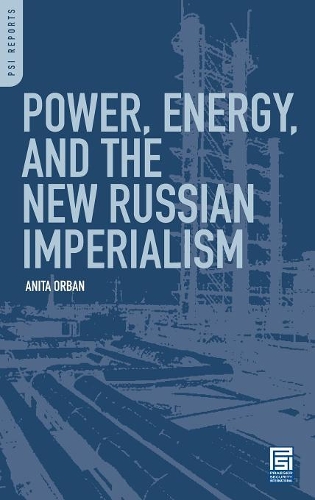
Power, Energy, and the New Russian Imperialism
(Hardback)
Publishing Details
Power, Energy, and the New Russian Imperialism
By (Author) Anita Orban
Bloomsbury Publishing PLC
Praeger Publishers Inc
30th September 2008
United States
Classifications
Tertiary Education
Non Fiction
Environmental management
333.8230947
Physical Properties
Hardback
264
Width 156mm, Height 235mm
539g
Description
Russia is the world's foremost energy superpower, rivaling Saudi Arabia as the world's largest oil producer and accounting for a quarter of the world's exports of natural gas. Russia's energy reserves account for half of the world's probable oil reserves and a third of the world's proven natural gas reserves. Whereas military might and nuclear weapons formed the core of Soviet cold war power, since 1991 the Russian state has viewed its monopolistic control of Russia's energy resources as the core of its power now and for the future. Since 2005, the international news has been filled with Russia's repeated demonstrations of its readiness to use price, transit fees, and supply of gas and oil exports as punitive policy instruments against recalcitrant states that were formerly part of the Soviet Union, striking in turn the Ukraine, Georgia, Azerbaijan, Armenia, Belarus, and Lithuania. Orban reveals for the first time in Power, Energy, and the New Russian Imperialism Russia's readiness to wield the same energy weapon against her neighbors on the west, all of them former Soviet satellite states but now EU and NATO member nations: the three Baltic nations and the five East European nations of Poland, Slovakia, Hungary, the Czech Republic, and Slovenia. Orban shows how the Kremlin since 1991 has systematically used Russian energy companies as players in a concerted neo-mercantilist, energy-based foreign policy designed to further Russia's neo-imperial ambitions among America's key allies in Central East Europe. Her unprecedented analysis is key to predicting Russia's strategic response to American negotiations with Poland and the Czech Republic to host the US missile shield. She also reveals the economic and diplomatic modus operandi by which Russia will increasingly apply its energy clout to shape and coerce the foreign policies of the West European members of the EU, as Russia's contribution to EU gas consumption increases from a quarter today to three-quarters by 2020. Orban proves that Russia's neo-mercantilist energy strategy in East Europe is not at all dependent on the person of Putin, but began under Yeltsin and continues under Medvedev, the former chairman of Gazprom.
Reviews
"Anita Orban has written a pioneering study of the way the government of Russia uses its energy resources as an instrument of foreign policy. This strategy presents many dangers to the West, and she also suggests ways of neutralizing it."-Richard Pipes, Professor of History, Emeritus, Harvard University
"Anita Orban's timely book about the relationship between Central Europe and Russia is theoretically sophisticated, empirically rich, thoughtful, well-written, and, best of all, provocative."-Rawi Abdelal, Professor, Harvard Business School
"Important and timely, Ms. Orban's careful and illuminating study of Russian energy policies, and their geopolitical implications, is essential reading for European and American policymakers."-Robert Kagan, Senior Associate at the Carnegie Endowment for International Peace
"This remarkable book is a wake-up call not only for U.S. policymakers, but for leaders of the European Union as well. Most of all, it should be read and its recommendations adopted by Government leaders in the nations recently admitted to the E.U. It is must reading for all who want to better understand the threat presented by Russian Imperialism."-Ambassador George Herbert Walker, Former U.S. Ambassador to Hungary
Author Bio
Anita Orban is the Executive Vice President of the International Center for Democratic Transition in Budapest. She is a foreign affairs columnist for Heti Valasz, one of Hungary's leading political weeklies, and served as the editor of its foreign affairs section. She has advanced degrees in international relations from the Fletcher School of Law and Diplomacy, Tufts University, and has taught at various universities in Budapest. Fluent in English, Russian, German, and Hungarian, Orban is a frequent speaker on foreign policy issues and contributor to journals published in Hungary, Poland, Estonia, and the UK.
